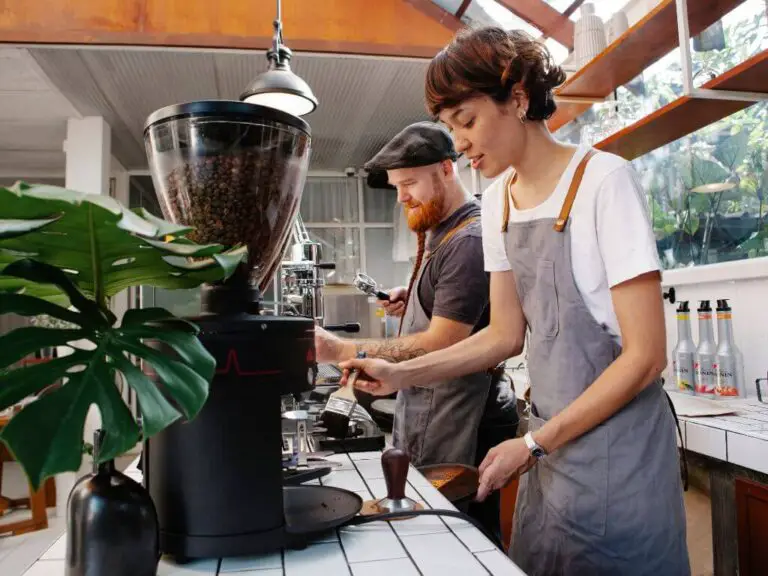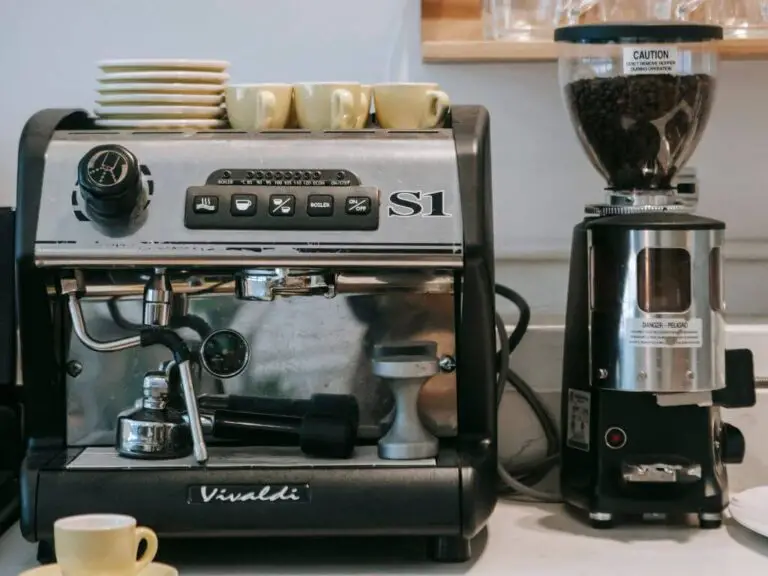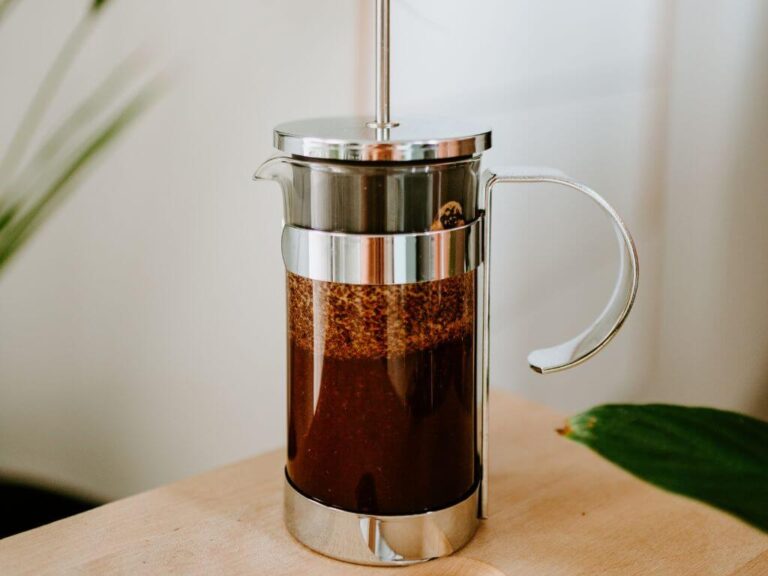How to Use DeLonghi Espresso Machine: Ultimate Beginner’s Guide
Welcome to your new favorite morning ritual! If you’ve just brought home a DeLonghi espresso machine, you’re moments away from brewing rich, café-quality espresso in your own kitchen. But before you pull that first perfect shot, let’s walk through everything you need to know—from unboxing to frothing milk like a barista.
DeLonghi is a trusted name in home espresso, known for user-friendly designs and consistent performance. Whether you have a manual, semi-automatic, or super-automatic model, this guide will help you master your machine quickly. We’ll cover:
✅ Unboxing & setup – Avoid common beginner mistakes.
✅ Brewing techniques – From grind size to extraction time.
✅ Milk frothing tips – For lattes, cappuccinos, and more.
✅ Maintenance & troubleshooting – Keep your machine running smoothly.
By the end, you’ll be pulling espresso shots that rival your favorite coffee shop’s—without the wait or the high price tag. Let’s get started!
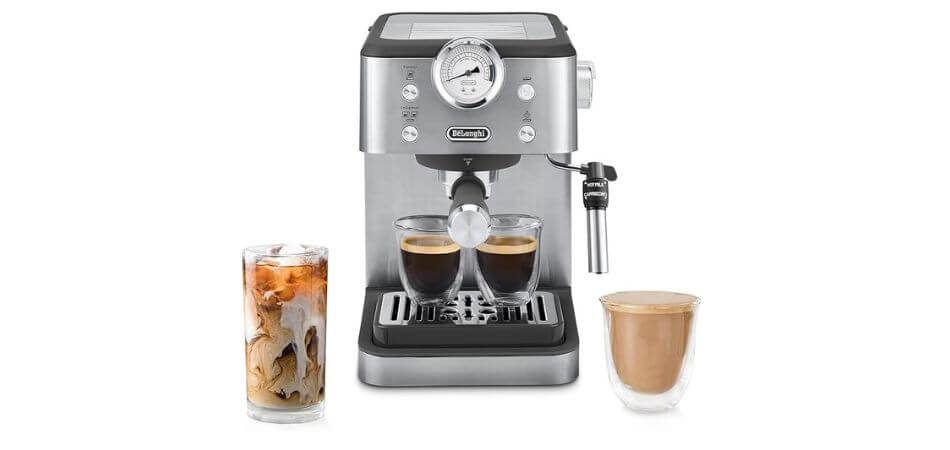
Unboxing & Initial Setup
Your DeLonghi espresso machine arrives packed with everything you need to start brewing. Here’s how to set it up correctly the first time.
What’s in the Box?
Most DeLonghi machines include:
✔ Portafilter (with single/double-shot baskets)
✔ Water tank (removable for easy filling)
✔ Drip tray (catches spills and excess water)
✔ Measuring scoop/tamper (varies by model)
✔ User manual (keep this handy!)
Step-by-Step Setup
- Choose the Right Spot
- Place on a stable, level surface near an outlet.
- Leave 2–3 inches of space around the machine for ventilation.
- Assemble the Machine
- Insert the water tank (fill with cold, filtered water).
- Attach the portafilter by twisting it into the group head.
- Slide in the drip tray.
- First-Time Cleaning
- Before brewing, rinse the water tank and portafilter to remove dust.
- Run a water-only cycle (no coffee) to flush the system.
Pro Tip:
“Skip tap water if your area has hard water—mineral buildup can damage your machine over time. Use filtered or bottled water instead.”
Why This Matters
A proper setup ensures:
🔹 Longer machine lifespan (no clogs or scale buildup).
🔹 Better-tasting espresso (no residual factory oils).
🔹 Fewer errors (e.g., leaks from misaligned parts).
Now that your machine is ready, let’s dive into how it works!
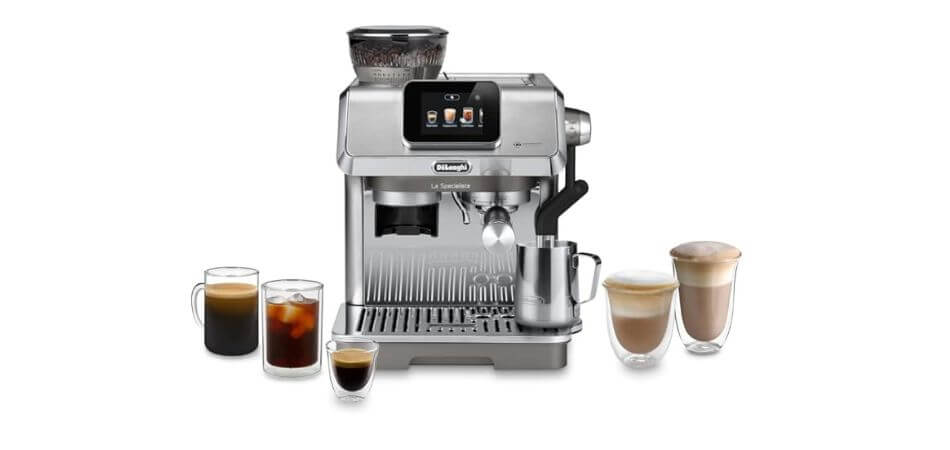
Understanding Your DeLonghi Espresso Machine
Before brewing, let’s break down the key components of your DeLonghi and their functions.
Main Parts & Their Roles
| Part | Function |
|---|---|
| Portafilter | Holds coffee grounds; locks into the group head for brewing. |
| Steam Wand | Froths milk for lattes/cappuccinos (on most models). |
| Control Panel | Buttons for power, brewing, and steam (varies by model). |
| Water Tank | Stores water; removable for easy refilling. |
| Drip Tray | Catches spills and excess coffee. |
Types of DeLonghi Machines
- Manual/Semi-Automatic
- You control grind size, tamping, and extraction time.
- Best for coffee enthusiasts who want customization.
- Super-Automatic
- Grinds, tamps, and brews with a button press.
- Ideal for beginners or busy households.
Pro Tip:
“Check your manual for model-specific features—some DeLonghis have programmable shot volumes or built-in grinders.”
Why This Matters
Knowing your machine helps you:
🔹 Troubleshoot issues (e.g., if the steam wand isn’t working).
🔹 Use all features effectively (like adjusting brew strength).
🔹 Clean properly (each part needs different care).
Up next: prepping your machine for its first brew!
Preparing the Machine for First Use
Before you pull your first shot, it’s crucial to properly prepare your DeLonghi espresso machine. This ensures optimal performance and the best-tasting espresso right from the start.
Step-by-Step Preparation Guide
- Fill the Water Tank
- Use filtered or bottled water to prevent mineral buildup.
- Avoid distilled water (it lacks minerals needed for proper extraction).
- Fill to the MAX line—don’t overfill.
- Power On & Preheat
- Plug in the machine and turn it on.
- Most DeLonghi machines have an indicator light showing when heated.
- Allow 5-10 minutes for full heating (critical for proper extraction).
- Prime the Machine
- Run water through the group head without coffee for 10 seconds.
- This:
- Removes any residual manufacturing oils
- Stabilizes water temperature
- Ensures proper water flow
- Warm Your Cup
- Place your cup on the warming tray (if available).
- Or rinse with hot water to maintain ideal serving temperature.
Pro Tip: “Always start with a cold machine in the morning. The initial heat-up is when temperature stability matters most for flavor.”
Why Proper Preparation Matters
✅ Consistent Temperature = Balanced extraction
✅ Clean Taste = No residual flavors
✅ Machine Longevity = Proper water flow from day one
Now that your machine is prepped, let’s move to the exciting part—brewing your first shot!
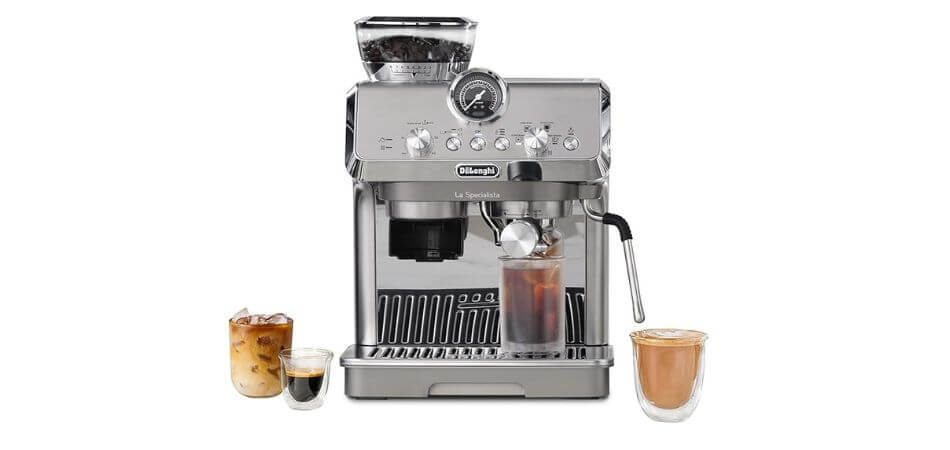
Brewing Espresso Like a Pro
This is where the magic happens! Follow these steps for perfect espresso every time.
Using Ground Coffee
| Step | Action | Details |
|---|---|---|
| 1 | Grind Your Beans | Fineness like table salt (30 sec grind time for fresh beans) |
| 2 | Dose the Portafilter | 18-20g for double shot (use your machine’s scoop) |
| 3 | Distribute & Tamp | Level grounds, then tamp with 30 lbs pressure |
| 4 | Lock & Brew | Firmly twist portafilter into group head |
| 5 | Monitor Extraction | 25-30 seconds for 2oz (look for honey-colored crema) |
Troubleshooting Brew Issues:
- Too Fast (<20 sec)? Grind finer or tamp harder
- Too Slow (>35 sec)? Grind coarser or reduce dose
- No Crema? Beans may be stale or grind too coarse
Using Coffee Pods (E.S.E. Pods)
- Insert the pod into the holder
- Select the pod setting if your machine has one
- Brew as normal (no tamping needed)
Pro Tip: “Even with pods, always run a quick water-only cycle first to heat the system properly.”
Frothing Milk Like a Barista
Transform your espresso into café-worthy drinks with perfect milk texture.
Milk Frothing Steps
- Choose Your Milk
- Whole milk: Best foam stability
- Alternatives: Oat milk froths well too
- Steam Wand Prep
- Purge steam wand for 2 seconds
- Submerge tip just below milk surface
- Frothing Technique
- Positioning: Keep wand at a slight angle
- Sound: Listen for a paper-tearing “psst” sound
- Temperature: Stop at 150°F (too hot = scalded milk)
Milk Textures for Different Drinks:
| Drink | Texture |
|---|---|
| Cappuccino | Thick, velvety foam |
| Latte | Silky, liquid texture |
| Flat White | Microfoam with shine |
Clean Immediately After Use! Wipe wand and purge again to prevent clogging
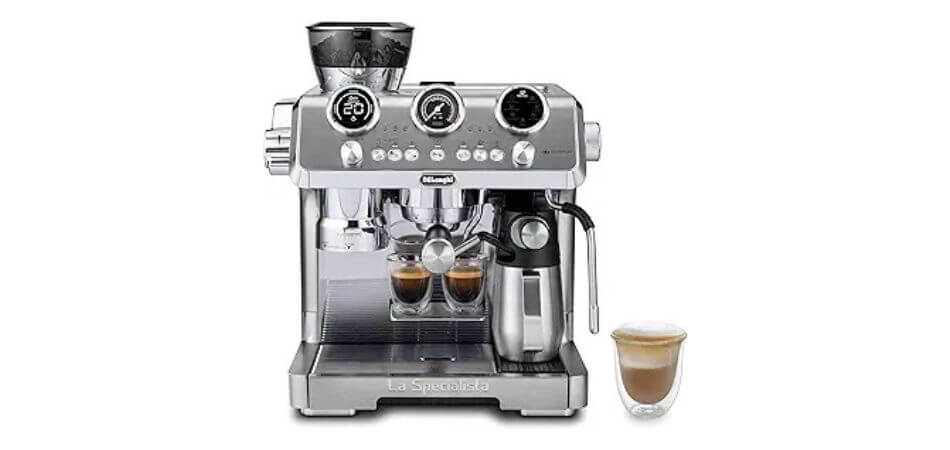
Cleaning & Maintenance: Keep Your Machine in Top Shape
Your DeLonghi espresso machine is an investment – proper care ensures it keeps making great coffee for years. Here’s exactly how to maintain it.
Daily Cleaning Routine
After Each Use:
- Portafilter & Basket
- Knock out used grounds immediately
- Rinse with warm water (no soap!)
- Dry with a clean cloth
- Steam Wand
- Wipe with damp cloth immediately after use
- Purge steam for 3 seconds to clear milk residue
- Drip Tray & Grid
- Empty and rinse daily
- Wipe dry to prevent bacterial growth
Weekly Deep Clean:
- Backflush with cleaning powder (if your model supports it)
- Soak portafilter and baskets in espresso cleaner overnight
- Wipe down exterior with mild detergent
Descaling: The Most Important Maintenance
When to Descale:
- Every 1-3 months (depending on water hardness)
- When you notice:
- Slower brewing
- Unusual noises
- Bad tasting coffee
Step-by-Step Descaling:
- Prepare Solution:
- Mix DeLonghi descaler with water (follow package instructions)
- Run Descaling Cycle:
- Fill tank with solution
- Start descaling mode (varies by model)
- Let solution run through entire system
- Rinse Thoroughly:
- Run 2-3 tanks of clean water through
- Wipe all accessible parts
Pro Tip: “Set a calendar reminder for descaling – it’s easy to forget but crucial for machine health!”
Troubleshooting Common Issues
Even the best machines sometimes need troubleshooting. Here’s how to fix the most common DeLonghi problems.
Espresso Problems & Solutions
| Symptom | Likely Cause | Fix |
|---|---|---|
| Weak, watery coffee | Grind too coarse | Adjust to finer setting |
| Bitter, burnt taste | Over-extraction | Use coarser grind or reduce brew time |
| No crema | Stale beans or wrong grind | Use fresh beans (roasted <4 weeks ago) |
| Coffee leaks | Loose portafilter | Twist firmly until resistance felt |
Machine Malfunctions
Machine Won’t Turn On:
- Check power cord connection
- Ensure water tank is properly seated
- Look for tripped circuit breaker
Steam Wand Not Working:
- Check if steam function is activated
- Clear clog with pin (after machine cools)
- Descale if problem persists
Unusual Noises:
- Gurgling = air in system (try priming)
- Grinding = needs descaling
- Clicking = normal heating sounds
When to Call Support:
- Persistent leaks
- Error codes that won’t clear
- Electrical issues
Pro Tips for Espresso Perfection
Take your home barista skills to the next level with these expert techniques.
Advanced Brewing Techniques
- The Weiss Distribution Technique (WDT)
- Use a paperclip or special tool to break up clumps before tamping
- Creates more even extraction
- Temperature Surfing
- For non-PID machines:
- Run a blank shot to heat group head
- Wait 30 seconds before brewing
- For non-PID machines:
- Pressure Profiling
- Some advanced models allow adjusting pressure during extraction
- Start low (3 bars), peak at 9 bars, taper at end
Bean Selection Guide
Best Beans for Espresso:
- Dark Roasts: Classic espresso flavor
- Medium Roasts: More nuanced flavors
- Single Origin: Unique terroir characteristics
Storage Tips:
- Keep in airtight container
- Store at room temperature
- Buy in small quantities (250g max)
Accessories Worth Investing In
- Quality Grinder
- Burr grinders give most consistent results
- Digital Scale
- Measure to 0.1g precision
- Bottomless Portafilter
- Helps diagnose extraction issues
Conclusion: Your Home Barista Journey Begins
Congratulations! You’re now equipped with everything needed to master your DeLonghi espresso machine. Remember:
🌟 Practice makes perfect – Your first shots might not be ideal, but you’ll improve fast
🌟 Experiment – Try different beans, grinds, and techniques
🌟 Maintenance is key – A clean machine makes better coffee
Ready to upgrade your setup? Check out our guides on:
- Best espresso beans for home brewing
- Advanced latte art techniques
- Comparing DeLonghi models
Now go enjoy that perfect shot you’ve earned! ☕
FAQ’s
How do I work my Delonghi espresso machine?
To use your DeLonghi espresso machine, fill the water tank, insert a pod or ground coffee, select your brew size, and press start. Always prime it first by running water through without coffee! ☕
(Tip: Check your model’s manual for specific settings – most have a simple one-touch operation.)
How do you make espresso with a Delonghi?
To make espresso with a DeLonghi, fill the portafilter with finely-ground coffee, tamp firmly, lock it in, and press the espresso button. For best results, preheat your machine and use fresh beans! ☕
(Pro tip: Adjust grind size and dose for stronger or smoother shots.)
How do you use an espresso machine step by step?
To use an espresso machine:
Grind fresh beans (fine, like salt)
Tamp firmly (30 lbs pressure)
Brew (25-30 sec for 1-2 oz)
Enjoy! ♨️☕
(Pro tip: Preheat your cup & machine for best results!)
How to use Delonghi coffee machine for the first time?
To use your DeLonghi coffee machine for the first time, rinse the water tank, run a water-only cycle to clean the system, then insert coffee and select your preferred brew. Check the manual for model-specific tips! ☕
(Pro tip: Always prime the machine by letting it heat fully before brewing for best results.)

